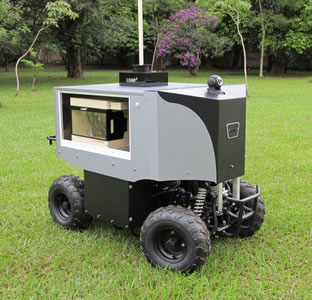UTSA chemist awarded $300K by NASA to build lab-on-a-robot prototype

Lab-on-a-robot prototype

Lab-on-a-robot prototype
(Nov. 6, 2013) -- UTSA chemistry professor Carlos Garcia, UTSA physics professor Arturo Ayon and HJ Science & Technology Inc. of Santa Clara, Calif., have been awarded more than $300,000 in NASA funding to build the fourth prototype of a "lab-on-a-robot" (LOAR). The Rover-like prototype will be designed to conduct on-site planetary compositional analysis.
Utilizing wireless technology, the current LOAR is able to navigate to a global position location, acquire an air sample, perform the analysis and send the data to a remote station without exposing the analyst to the testing environment.
Additionally it's equipped with a chemical sensor that sits atop a highly integrated mobile platform. The chemical sensor contains a microchip with the capacity to determine the composition of a sample in a few minutes.
"This lab-on-a-robot could lay the groundwork for the next generation of NASA robotic missions by allowing for the analysis of air samples or biological compounds without the threat of danger to a human operator," said Garcia.
Additionally, the LOAR also could be used commercially to monitor environmental pollutants that could pose a threat to human health or the environment. Evaluation of samples on-site would provide real-time data analysis and reduce the time and costs associated with conventional laboratory techniques.
The original prototype built in 2008 was a collaboration between UTSA chemistry professor Carlos Garcia and UTSA physics professor Arturo Ayon in the Micro-ElectroMechanical systems (MEMS) Laboratory. Subsequent prototypes were joint efforts with the University of Sao Paulo, Brazil. A member of that team, Eric Tavares da Costa, will join Garcia's lab to work on the latest LOAR prototype.
The NASA funding will be directed to build the fourth upgraded prototype, using the experience collected during the development of previous versions that were funded through UTSA and the Department of Defense Office of Naval Research.
Events
Learn to use the simple but powerful features of EndNote®, a citation management tool. In this hands-on workshop, participants will learn to setup an EndNote library, save references and PDFs, and automatically create and edit a bibliography.
Virtual Event ( Zoom)The Urban Bird Project at UTSA will discuss urban bird populations, conservation efforts, and how you can get involved.
JPL Assembly Room (4.04.22,) Main CampusThe DMPTool is a free online resource that helps researchers create data management plans. This workshop will cover the main components of DMPs and how to create them using the DMPTool. Attendees will learn to: locate templates by funding agency, add research collaborators, and identify institutional guidance.
Virtual Event (Zoom)Join UTSA Libraries and Museums to learn more about the publishing discounts available for UTSA researchers. Current agreements include Elsevier, Cambridge University Press, Wiley, and more. Bring your questions and feedback for the library as we continue to pursue partnerships with publishers to reduce costs for our researchers.
Virtual Event (Zoom)Citation managers such as Zotero® can help you store and organize the citations you find during your research. Zotero can also generate bibliographies in various styles, insert in-text citations and allow you to share sources with collaborators.
Virtual Event (Zoom)Have questions about making your OER accessible on UTSA Pressbooks? The OER Team and the Digital Accessibility are ready to answer them! Bring your questions about OER and accessibility and receive guidance from our two teams.
Virtual Event (Zoom)In this workshop, attendees will be introduced to Pandas, a Python tool for working with data easily. It makes it simple to organize and analyze information when data is organized and categorized, like spreadsheets or tables.
Group Spot B, John Peace Library

